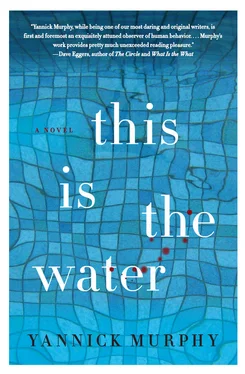This is Kim’s mother at a home meet, watching Kim’s younger sister race. She cannot bear to watch this daughter, though; it reminds her too much of watching Kim race. Kim’s sister will grow up to look like Kim. Kim’s sister has the same wispy blond hair that looks almost white. Kim’s sister’s butterfly stroke even seems to have the same rhythm. This is Kim’s mother leaving the bleachers, walking out to her car and sitting in the driver’s seat with her hands draped over the wheel and her head down, hating herself for not being in the bleachers to cheer for her younger daughter, the one who still lives.
This is Sofia at the same home meet looking around her at all the other swimmers. Before races, some swimmers are goggle-adjusters and some are heat-sheet freaks and some are bathroom-goers and some are visualizers. The goggle-adjusters can’t stop adjusting their goggles while they’re up on the blocks waiting for the start whistle. They pull their goggles away from their eyes and put them back on again, and then they tighten their straps and tighten them again. The heat-sheet freaks, before their race, check the sheets taped on the wall, making sure they know their correct heat and lane, even though they have checked it ten times before. The bathroom-goers do just that. The visualizers, Sofia thinks, look the most foolish. She sees one now behind the block. She’s a girl about Sofia’s height and build. She’s waiting for her event with her eyes closed and moving her hands in the air as if the air were the water and she were already swimming her race. Sofia knows that the girl is visualizing her entry, she knows she is visualizing how many strokes she will take until she gets to the wall, she knows she is feeling the wall under her feet at the turn and seeing herself winning the heat. Either the girl read about using visualizing as a technique or her coach encouraged her to do it. Either way, Sofia thinks, it looks ridiculous. I will not be a visualizer, Sofia says to herself. No matter how much I want to win for the team, to win for Kim, to win for myself, I will be a no-breather, a goggle-adjuster, a heat-sheet freak, a bathroom-goer, but never a visualizer. I just can’t do that. She dives in at the start of her one-hundred free, feeling good and knowing that she didn’t visualize the race at all. She has no idea how it will end. She has no idea if she’ll win or not. She’s just going to try her best, and enjoy it. When she’s finished and out of breath, taking her goggles off at the wall, she looks up at the board. Whoever the girl was in lane four came in first, she thinks, and then she remembers, Oh, I was in lane four. She smiles and says thank you after she pulls herself up out of the pool and the timer in her lane says, “Great race!” In the warm-down pool she hears the shouts of children playing, going down the slide in the water park that connects to the warm-down lane. Out the windows, clouds are passing quickly in front of the sun, and she is enjoying watching herself underwater, the light at play, turning her arms from dark to brightly lit with each stroke.
F loyd can still do as many chin-ups as he did thirty years ago. He stays in shape. He has a metal bar in his doorway that he bought at a sporting goods store and attached to the doorframe. When he first put the bar up, and tried his first chin-up, he fell. He had made the mistake of screwing it into what he thought was solid wood, but was really a composite wood the previous owner had used to fix the rotting doorframe. When he fell he hit his head, and blood poured from where he had cut it on the sharp corner of the base molding. He was surprised at the blood that poured down his forehead and into his eye. He thought it strange that with all the blood he had seen pour from his victims’ throats before, the sight of his own blood still made him queasy. He immediately began to take off his bloodied tee shirt and went to reach for a plastic bag, ready to dispose of it the way he did his other bloodied clothes. He would weight it down with a rock and throw it into a nearby lake, or burn it in a campfire, far out in woods that were not near his house, such as the wooded land owned by the state, where the occasional black bears lived, and where hunters baited them by dumping feed corn in piles on the ground near wild blackberry bushes or near the occasional wizened apple tree that no longer bore sweet fruit, but had been left unpruned for so long its fruit was sour and worm-holed. He sat back down and laughed at himself. There was no reason to hide traces of his own blood from a cut he had received from a fall in his own house.
He has been asked by the principal to look in on the sheep this weekend. Everyone who works at the school is taking turns on weekends watering them and tossing them a flake of hay over the electric fence. He wants to tell the principal no, because he has chosen this weekend to do what he has really wanted to do lately. He wants to kill again. It has been weeks since the last time, and this is how it goes for him usually, when he has a killing spree, a word he likes because it reminds him of “free,” which is exactly how he feels afterward, free for some reason that he doesn’t care to explore or explain. There are some things, he believes, that should not be questioned. He doesn’t know how he will have time to water and feed the sheep, when he will be busy, of course, cleaning up after having just killed. “Floyd, please, could you do it?” the principal asks, and Floyd, not wanting to be asked why he can’t do it, says, “Yes.”
So this killing weekend will have a slight twist to it, Floyd thinks. There will be a shadow of something hanging over him because it will be something he will have to do for the school, and usually when he has a killing weekend he does not have to think about anything except the killing, and in this way it is like a vacation for him. He does not even cook for himself on a killing weekend. He likes to go to restaurants. He sometimes goes to a movie. He does not behave like his usual self on those weekends. He will not shave. He will wear clothes he would never wear otherwise — polo shirts and khakis. He will even buy a bottle of cologne on those weekends and put it on outside of the drugstore where he bought it, and then he will throw the bottle away so it cannot be traced to him. He feels different on those weekends. He feels younger and stronger. If he catches sight of his reflection in a restaurant window, he can see how the short sleeve hem of the polo shirt he’s wearing clings to his bicep muscle, which is firm and defined from his labors at his chin-up bar in his doorway at home.
He can’t wait to do it another weekend, when he would not be asked to feed and water the sheep, because his spree is on. The time is now. Because it is a weekend, he knows that no one else will be at the school, and it will be dark, and no one will see that he is dressed in a polo shirt and khakis. Stopping at the school and taking care of the sheep will be on his way to the roads he will take whose woods border the back of a rest stop he has been planning on going to. Contrary to popular belief, Floyd is not predatory, as most people think serial killers are. He does not need to select a woman to follow for weeks beforehand. Kim was an exception. He is content to just wait in the woods until a lone woman drives up into the parking lot of the rest stop to use the bathrooms. He likes the young women, he must confess, because they seem the most surprised when they realize they are going to die. The older women, in the space of a second, seem to come to terms with their death, and tell themselves that at least they have lived the best years of their lives. He hopes he will encounter another young woman like Kim. One who has just begun driving, who has listened to the advice to stop every now and then when you’re driving at night so that you don’t fall asleep at the wheel. It is in a woman’s eyes this young that he seems to see the injustice so acutely. Floyd wishes, at times, that he could capture that look with a camera.
Читать дальше












